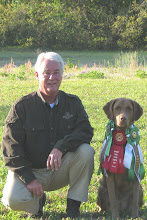It is time to begin this journey into understanding dogs, as dogs...not furry humans, not as our vicarious children, not as some kind of livestock bred for our use, or entertainment..but most of all, not as an extension of who we are personally. If we truly want to understand dogs, we must divest ourselves of ourselves, and look...as objectively as we can...at dogs just being dogs.
‘...dogs just being dogs.’ is a loaded statement that begs to be unpacked. There are, currently, two evolutionary views of dogs. One view holds that dogs are the direct descendants of wolves. Wolves are Canis lupus, and dogs are their direct descendants, Canis lupus familiaris. In this view dogs were wolves until sometime in the relatively recent past (about 15,000 years ago) when dogs became domesticated by humans. The other view is that dogs and wolves had a common ancestor, and branched into different species Canis lupus (wolves), and Canis familiaris (dogs) around a half-million years ago This view implies that dogs domesticated themselves as a natural adaptation to a ecological niche that was concurrently evolving (the agricultural revolution), and involved co-evolution with humans. See http://newguinea-singing-dog-conservation.org/Tidbits/OriginOfTheDog.pdf and http://www.nonlineardogs.com/socialorganisation.html for a more in-depth discussion.
What does it matter? I mean, really? Dogs are dogs are dogs...by any other name. Well, I think it matters very much. If you think your dog is a direct descendant of wolves, then the way wolves behave, individually and socially will provide a blueprint for the way your dog behaves, and also provide clues for how you should attempt to modify your behavior in order to modify your dog’s behavior to make it more acceptable to humans, i.e – communicate with your dog as if he were a wolf. This leads us into the surreal world of ‘Pack Theory’ and ‘Dominance Theory’, which in its original form has been critically challenged if not debunked entirely. If, on the other hand, you view dogs as co-evolving with humans, you will have to consider how to effectively communicate with an animal that has evolved¸ naturally, to communicate with you, and therefore, has a voice in the conversation.
So, what is your view of dogs? What do you think about dogs, and why do you think that way?
Sunday, March 28, 2010
Subscribe to:
Post Comments (Atom)

2 comments:
To what I can observe, viewing dogs as "wolves descendants" may have some interesting elements to observe but I don't think we can base an entire point of view according to that. If for one that theory of "dominance" explains eveything, it may be because it suites that person (in need of dominance).
Personally, I take a look at wolves behavior in a general matter but my main interest and work are related with the evolution of dogs beside humans. We know their opportunism and this becomes a powerful tool to use when working with them. On top of that, thru all this evolution, domestication, breeding sequences and improvement of our understanding about those companions, we can find better ways to communicate with them and develop a human-dog team work that encourages cooperation.
We all agree that dogs have differences, even into the same breed and same breeding. Some learn more quickly, some have greater desire, some are more observative than others, etc. Aknowledging to this opens a door for recognizing that dogs may have more complexe personalities than what the common opinion says... So why not digging a little deeper in that direction, build a better understanding of dogs and adapt our ways to communicate with them ?
This is my personal opinion and this inspires my work dedicated to improve our communication with dogs.
Without having any scientific documentation, though I've read several, I feel that dogs are deserving of a communicative relationship with us. They are not property but can work as a team mate. Team mates communicate. I think both species has something to bring to the table in this relationship. This does not mean I view my dog as my total equal capable of making decisions in the same way I do. But I would like to learn to communicate rather than force. As a trainer, I work with people and their dogs every day. I look forward to exploring ways to communicate to dogs the rules to live by in our human world so they won't have to be sent to shelters. Agreeing that dogs are sentient beings does not absolve them from following social rules. I believe they are social animals respecting social hierarchies - not packs in the wolf sense where multiple animals work together for a common end - kill food to eat. The most compelling reason for looking at dogs as separate from wolf rules, is that they do not hunt as a unit. The studies of dogs that I have read have found dogs to be scavengers, not hunter/killers. They might still kill something, but that is not their main method of obtaining food.
So I look forward to other's thoughts and will have some documentation next time. Here's to the companion dogs we share our lives with.
Terry
Post a Comment